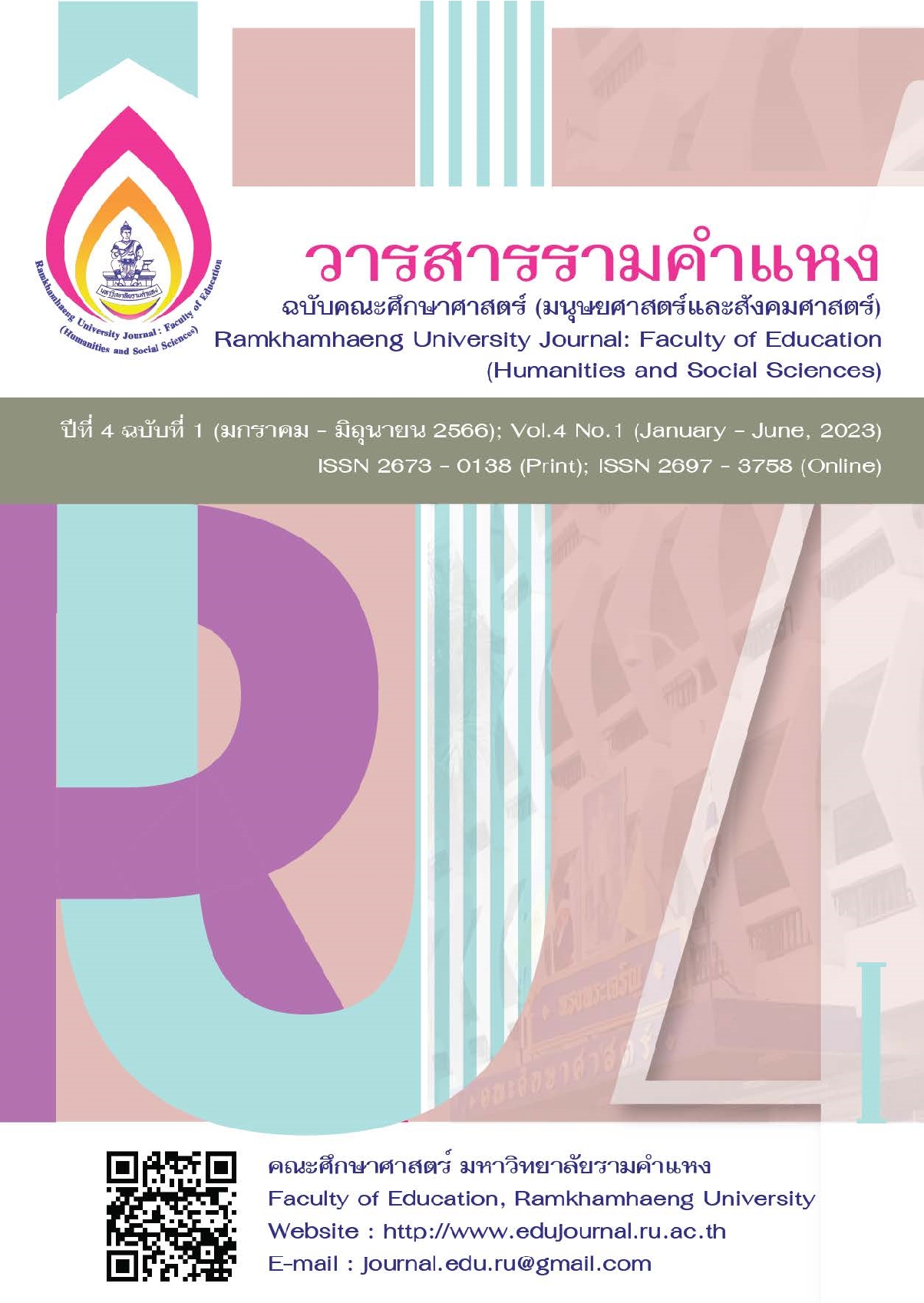องค์ประกอบพฤติกรรมความมีวินัยในตนเองในการเรียนออนไลน์ ของนักศึกษาระดับปริญญาตรีมหาวิทยาลัยรามคำแหง
Main Article Content
บทคัดย่อ
การวิจัยครั้งนี้มีวัตถุประสงค์เพื่อศึกษาองค์ประกอบพฤติกรรมความมีวินัยในตนเองในการเรียนออนไลน์ของ นักศึกษาระดับปริญญาตรีมหาวิทยาลัยรามคำแหง ใช้การวิจัยเชิงสำรวจ กลุ่มตัวอย่างคือนักศึกษาระดับปริญญาตรี มหาวิทยาลัยรามคำแหง จำนวน 1,045 คน โดยสุ่มตัวอย่างแบบชั้นภูมิ เก็บรวบรวมข้อมูลด้วยแบบสอบถาม ใช้การวิเคราะห์องค์ประกอบเชิงสำรวจในการวิเคราะห์ข้อมูล สกัดองค์ประกอบด้วยวิธี Principal Component Analysis และใช้การหมุนแกนแบบ Varinax ผลการวิจัยพบว่า องค์ประกอบพฤติกรรมความมีวินัยในตนเอง ในการเรียนออนไลน์ของนักศึกษาระดับปริญญาตรีมหาวิทยาลัยรามคำแหง มีจำนวน 5 องค์ประกอบ ประกอบด้วย ความขยันอดทนและรับผิดชอบ ความตั้งใจและเชื่อมั่นในตนเอง ความตรงต่อเวลา การควบคุมตนเอง และการมีสมาธิในการเรียน ทั้ง 5 องค์ประกอบเหล่านี้สามารถอธิบายความแปรปรวนพฤติกรรมความมีวินัยในตนเองในการเรียน ออนไลน์ของนักศึกษาระดับปริญญาตรีมหาวิทยาลัยรามคำแหงได้ร้อยละ 62.523
Downloads
Article Details

อนุญาตภายใต้เงื่อนไข Creative Commons Attribution-NonCommercial-NoDerivatives 4.0 International License.
ผู้ส่งบทความ (และคณะผู้วิจัยทุกคน) ตระหนักและปฎิบัติตามจริยธรรมการวิจัยอย่างเคร่งครัด ทั้งนี้บทความ เนื้อหา ข้อมูล ข้อความ ภาพ ตาราง แผนภาพ แผนผัง หรือข้อคิดเห็นใดๆ ที่ปรากฎในบทความ เป็นความคิดเห็นและความรับผิดชอบของผู้ส่งบทความ กองบรรณาธิการไม่จำเป็นต้องเห็นตามเสมอไป และไม่มีส่วนรับผิดชอบใดๆ โดยถือเป็นความรับผิดของของเจ้าของบทความเพียงผู้เดียว
เอกสารอ้างอิง
Chanmaha, A. (1999). A study of ethics in self-discipline among students in Roi Et Province. [Master's Thesis, Srinakharinwirot University]. (in Thai)
Chieblaem, S. (2012). The development of life skills scale for students. Bangkok: Chulalongkorn University. (in Thai)
Department of Academic Affairs, Educational Research Division. (1999). Teacher's Guide to Creating Lesson Plans for Potential Development: An Experimental Project on Potential Development of Thai Children. Bangkok: Author. (in Thai)
Gorbunovs, A., Kapenieks, A., & Cakula, S. (2016). Self-discipline as a key indicator to improve learning outcomes in e-learning environment. Procedia-Social and Behavioral Sciences, 231, 256-262.
Hair, J. F., Black, W. C., Babin, B. J., & Anderson, R. E., (2010). Multivariate data analysis (7th ed). Hoboken, NJ: Pearson.
Hamutoğlu, B. B., Ünveren-Bilgiç, E. N., Salar, H. C., & Şahin, Y. L. (2021). The effect of e-learning experience on readiness, attitude, and self-control/self-management. Journal of Information Technology Education: Innovations in Practice, 20, 93-120. https://doi.org/10.28945/4822
Hong, J. C., Lee, Y. F., & Ye, J. H. (2021). Procrastination predicts online self-regulated learning and online learning ineffectiveness during the coronavirus lockdown. Personality and individual differences, 174, 110673. https://doi.org/10.1016/j.paid.2021.110673
Iam-Laor, N. (2002). Using the 'Love Ban Montfort' activity to develop the discipline of Prathomsuksa 1 students at Montfort Wittaya School in Chiang Mai Province. [Master's Thesis, Chiangmai University]. (in Thai)
Kaewpila, P., & Thongprong, A. (2021). Teacher’s Opinions on Self-Discipline of Secondary School Student in Group 6 Under the Secondary Educational Service Area Office 1. Journal of Roi Kaensarn Academi, 6(3), 173-184. (in Thai)
Khamanee, T. (2013). Teaching style: A variety of options. Bangkok: Chulalongkorn University Press. (in Thai)
Klahan, N. (1997). Development of ethics and self-discipline through group activities: A case study of grade 4 students at Ban Don Lamduan School. [Master's Thesis, Khon Kaen University]. (in Thai)
Landrum, B. (2020). Examining students’ confidence to learn online, self-regulation skills and perceptions of satisfaction and usefulness of online classes. Online Learning, 24(3), 128-146. https://doi.org/10.24059/olj.v24i3.2066
Mhuensurin, W., & Poopayan, P. (2021). The factors affecting student’s discipline in secondary level students of extended schools under the office of Chaiyaphum Primary Educational Service Area 2. Academic and research journals Northeastern university, 11(3), 228-242. (in Thai)
Mou, T. Y. (2021). Online learning in the time of the COVID-19 crisis: Implications for the self-regulated learning of university design students. Active Learning in Higher Education, 1–21. https://doi.org/10.1177/146978742110512
Na PomPetch, P. (2005). The encouragement guidebook: 29 lessons for success and happiness (2nd ed.). Bangkok: 108 ideas press. (in Thai)
Ngah, A. H., Kamalrulzaman, N. I., Mohamad, M. F. H., Rashid, R. A., Harun, N. O., Ariffin, N. A., & Osman, N. A. A. (2022). The sequential mediation model of students’ willingness to continue online learning during the COVID-19 pandemic. Research and Practice in Technology Enhanced Learning, 17(1), 1-17. https://doi.org/10.1186/s41039-022-00188-w
Office of the National Culture Commission, Thailand (1997). Project to strengthen student discipline across the country. Bangkok: Chongpon Trading. (in Thai)
Pangsai, S. (2004). Developing the operations to strengthen student discipline at Ban Phai School, Thawat Buri District, Roi Et Province. [Master's Thesis, Srinakharinwirot University]. (in Thai)
Photemei, W. (2005). Developing student discipline on cleanliness at Kae Pe Rat Niyom School, Muang District, Kalasin Province. [Master's Thesis, Mahasarakham University]. (in Thai)
Plawat, K. (1996). The effect of group counseling and group process on self-confidence of Mathayomsuksa 1 students at Ban Kut Kwang Prachasan School, Muang District, Khon Kaen province. [Master's Thesis, Khon Kaen University]. (in Thai)
Raksasub, S. (1991). Comparison of the effects of PREMAC and social reinforcement on the math study attention behavior of students in grade 6, Raksappittayakon School, Kabinburi District, Prachinburi Province. [Master's Thesis, Srinakharinwirot University]. (in Thai)
Sadiku, M. N., Adebo, P. O., & Musa, S. M. (2018). Online teaching and learning. International Journals of Advanced Research in Computer Science and Software Engineering, 8(2), 73-75.
Saengnga, S. (2019). Development self-discipline of early childhood by experience with music activities by Carl Orff, Ban Khwao Schoolม Muang District, Chaiyaphum Province. ARU Research Journal, 6(3), 61-68. (in Thai)
Saothong, T. (2018). Self-discipline of student of Stuk School under The Secondary Educational Service Area Office 32. [Master's Thesis, Burapha University]. (in Thai)
Shahijan, M. K., Rezaei, S., & Amin, M. (2016). International students’ course satisfaction and continuance behavioral intention in higher education setting: an empirical assessment in Malaysia. Asia Pacific Education Review, 17(1), 41-62. https://doi.org/10.1007/s12564-015- 9410-9
Sitthiphonworavej, J. (2018). Attitudes towards self-discipline in the domain of classroom discipline, study hardiness, and motivation for academic achievement of students in the vocational certificate level, Year 2, Attawit Commercial Technology College. Bangkok: Attawit Commercial Technology College. (in Thai)
Songsuwan, W. (2000). The effect of using the addition and subtraction learning package on learning achievement, self-discipline, and learning durability in mathematics of grade 3 students. [Master's Thesis, Srinakharinwirot University]. (in Thai)
Srikalasin, K. (2001). Student discipline. Encyclopedia of Education, 22, 7-14. https://ejournals.swu.ac.th/index.php/ENEDU/article/view/6001/5636 (in Thai)
Thanomklai, C. (1996). Development of self-discipline in patience of pre-elementary children with different intelligences by means of storytelling with hand puppets using questions in pre, during, and after storytelling. [Master's Thesis, Srinakharinwirot University]. (in Thai)
Thiwakorn, N. (2005). The 4 MAT religious activities handbook. Surat Thani: Diocese Pastoral Center. (in Thai)
Tirakanant, S. (2012). The multivariate analysis in social science research (2nd ed.). Bangkok: Chulalongkorn University Press. (in Thai)
Tirakanant, S. (2014). Research Methods in Social Sciences: A Guide to Practice. Bangkok: Chulalongkorn University Press. (in Thai)
Zhao, R., & Kuo, Y. L. (2015). The role of self-discipline in predicting achievement for 10th graders. International Journal of Intelligent technologies and applied statistics, 8(1), 61-70. https://doi.org/10.6148/IJITAS.2015.0801.05


